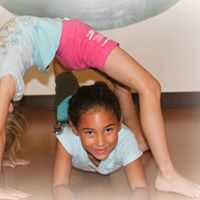Kids gain amazing benefits from regularly practicing yoga. Yoga offers physical, emotional, and mental gifts for Every Body. As learning and growing beings, kids are best suited to quickly absorb the principles of yoga. Studies report that today’s kids experience significant amounts of stress in both their academic and personal lives. Practicing yoga encourages youth not only to disconnect from technology, but additionally to find balance, focus, flexibility and strength to manage these stressors. Learning ways to quiet the mind and connect with the body, teaches children life skills that serve them on and off the mat.
Increasing Flexibility
Yoga assists the body and mind in increasing flexibility, which can be comforting as kids experience the aches and pains of growing. Learning easy postures such as standing forward fold and butterfly allow students to gain physical flexibility and confidence which in turn makes them more flexible of mind when things don’t go the way they expected. Increasing muscular flexibility is an added benefit for kids in sports, as more supple muscles often reduce the instance of injury. Teaching these concepts at a young age will plant the seed for kids to become more physically pliant and emotionally adaptable.
Building Strength
While yoga won’t be helpful in building bulky muscles, it is helpful in building lean, strong muscles and strong minds. Moderate strength not only helps student-athletes, but it offers all students in achieving life confidence. Working towards and mastering more difficult poses requiring strength such as crow exists as a milestone that children take pride in. Muscular strength, bravery, boldness and confidence gained while doing yoga are achievements that will serve them throughout life’s difficult moments.
Reducing Stress
Today’s kids experience higher stress levels due to demands on their academic and personal lives. Anxiety and Depression are at an all time high among young people. Yoga provides an outlet to help students reduce stress levels through breathing techniques, attention to the mind body connection as well as moderate levels of exercise. Unhealthy stress can lead to irritability, anxiousness, depression, and sleep issues. Regularly engaging in yoga can reduce stress and lead to happier kids. In a world rife with technological distractions, yoga offers kids the ability to connect not only with their bodies, but with their minds and breath as well.
Managing Emotions
The calming nature of yoga, paired with the different breathing techniques students learn in class can be very useful outside of class as well. Slow steady inhalations followed by slow steady exhalations will provide a calming effect while faster, shorter breaths can be energizing. Kids can learn to do these safely and in fun and engaging ways. Learning how and when to use these different breathing techniques can help youth manage a variety of emotions.
Encouraging Friendships
Taking a kids or tween yoga class or participating in yoga camp allows participants to engage with students their own age who hold similar interests. Additionally, some youth yoga classes offer partner activities that build on trust for certain partner posture sequences. The low-key nature of yoga encourages friendships to blossom both on and off the mat.
Nurturing a Mind-Body Connection
One of the most difficult connections for many young adults is forging a link between the mind and body. Yoga works to teach the young how to honor both their bodies and their minds. Developing this connection assists young students in learning how to both think of and treat their bodies positively. An important aspect of yoga is a student’s ability to push their limits while respecting their body’s current comfort levels. Yoga teaches its students to recognize limitations and honor the body’s current abilities.
Developing Self-Confidence
As both an exercise form and mind-body practice, yoga exists as an excellent choice to teach self-confidence. While some postures are easy, others demand a great deal of work and effort. Committing to a weekly class and practicing postures that can be challenging works to develop a kid’s confidence over time. In attempting postures and failing, students learn the difficult lesson of perseverance as they build both strength and balance. Continually trying, and improving incrementally teaches youth to persist in their goals and continue striving for what they want. While it may be achieving perfect balance in tree or strength during warrior , regularly showing up on their mat reinforces the belief that effort and determination are key components to success.
Practicing Taking Directions
The ability to listen to people in a position of authority exists as a fundamental life skill. Fostering positive role model interactions, such as yoga coaching, allows instructors the ability to positively impact children’s lives. This interaction between teacher and student exists as an important step in a young adult’s life as he or she learns to listen to adults outside of the family unit. As yoga instructors strive to improve their students’ physical health through the practice of postures, students learn to trust other adults in their lives and develop positive role model relationships
Kids can benefit from yoga in a variety of ways. First and foremost, they receive the physical benefits of yoga, resulting in stronger and more flexible bodies. Second, children who take yoga enjoy a greater mind-body connections, which can result in lower stress levels and a higher self-image. Third, regularly practicing yoga provides effective tools to deal with emotions inherent in their daily lives. Encouraging students to leave technology behind and confront themselves, and only themselves, on the mat exists as an integral strategy in developing self-confidence. Enrolling youth in yoga classes provides benefits that reach far beyond the mat: yoga exists as a full mind-body experience which demands kids find themselves and be comfortable with who they are.
